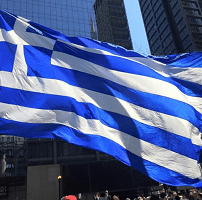Congratulations to our Essay Contest Winner Demetrios Maroutsos! On this Greek Independence Day, read on to learn what this Greek-American student had to say about the ‘Hellenic Spirit’.
Meet Essay Contest Winner Demetrios Maroutsos
Demetrios Maroutsos is a student at the University of Illinois Urbana-Champaign (U of I), pursuing a dual degree in Molecular and Cellular Biology, Honors Concentration and Anthropology along with a Spanish language minor. He spends a lot of his time researching at Das Labs in the Department of Comparative Biosciences and Biochemistry aiming to elucidate the link between lipid metabolism and inflammation.
He also plays the cello, and volunteers his time at Urbana High school mentoring students in the orchestra. Demetrios is a devout member of the Orthodox Christian Fellowship and Hellenic American Student Organization at U of I. A first generation Greek-American, he traces his Greek roots to Kalamata and Achladokambos. He feels a strong connection with his heritage and attributes much of his Greek identity to his family, friends, and the Hellenic American Academy, of which he is an alum. Read on to discover his compelling thoughts about the Hellenic Spirit.

By: Demetrios Maroutsos
The Indomitable Hellenic Spirit
It is interesting that despite living thousands of miles from its source, the Hellenic culture can thrive within the context of American society. While there are approximately 11,000,000 Hellenes on the planet out of the 7 billion human beings, they are capable to have a profound effect on the world in all contexts. Not only did the Greeks of the past found the principles for Western society, but the efforts and contributions of Hellenes in the present creates real change both in their communities and on a global scale. The Ancient, Byzantine and Modern Greeks despite the test of time, have consistently and greatly influenced the world around them. The thing that unites the Greeks of the past and the present is the existence of something that can only be described as a Hellenic pnevma (spirit). It is the same pnevma that fought to establish the Modern Greek state on March 25, 1821 and persists in the lives of the Hellenes of the present.
When I was posed the question: what does it mean to be Greek, I answered unwaveringly that it is defined as the ability to tap into the riches of the Hellenic culture and society and wield the Hellenic spirit in a way that I can share its greatness with the world. Inside each Hellenic individual exists a strong, primal, indomitable, force of Hellenism that drives them towards greatness.
Poetry of the Hellenic revolution
In order to get in the psyche of the Hellenic people, you need not look further than the poetry of the time. The poetry of the Hellenic revolution of 1821 beautifully voices the Hellenic spirit of the men and women who made the ultimate sacrifice in order to achieve freedom for the Hellenic people and found a nation state for generations to come. Rigas Feraios, a martyr to the revolution of 1821 and exceptional poet, recounts in his poem titled Thourios.
“It is better to live one hour in freedom, than forty years enslaved and imprisoned.”
Hardworking Hellenic Spirit
The Hellenes of the time were gasping for an opportunity to taste freedom after 400 long years of harsh slavery under the Ottomans. The Hellenic spirit was shackled under slavery and oppression and its force propelled the Hellenes of the time to revolt against all odds, and fight for their right to live every day as the strong and proud individuals that they are. The same Hellenic spirit was endowed into the core beings of the Greek immigrants in Chicago today. Thousands of immigrants uprooted themselves in pursuit of a new life in the United States whilst facing persecution and strife. It is the same Hellenic spirit of the revolutionaries that inspired the Hellenic immigrants to work hard, establish small businesses, build churches and found Greek schools. I myself am a product of those hardworking individuals, and I am deeply involved in the institutions founded by people of the Hellenic spirit. For me, being Greek means having a fighting spirit that drives me to pursue success and identify with my culture and heritage through language and values.

Sharing our heritage
Moreover, at the essence of the Hellenic spirit, is the ability for Hellenes to come together in groups, this is reflected in the memoirs of the past and the stories of the present. Being Greek is all about Greeks coming together and sharing in their culture, but primarily being able to connect with one another and establish relationships. This same, innate energy to come together and share in cultural traditions like food, dance, music, language and holidays as well as a mutual love for the mother country Hellas, was paralleled in the founding of Greece.
United Greeks are powerful
The Filiki Etairia (The Friendly Brotherhood) was a group of diasporic Hellenes founded by Athanasios Tsakalov, Nikolaos Skoufas and Emmanuil Xanthos. They came together to muster international support for Hellenic independence. The Filiki Etairia initiated numerous new members and worked to support the battle for independence. This fraternity is testament to the ability for Greeks to come together in a parea, or a group of people who come together to enjoy one another’s company.
Members of the Filiki Etairia were a parea that helped win the war for independence in 1821. Partaking in parea is an integral part to the Hellenic spirit because Greeks from all over the world seek each other out. From the example of the Filiki Etairia we see they can create powerful change to Greece, and to the world; the power of the Hellenic spirit is multiplied when we come together.
Huge organizations such as: the Greek Orthodox Church that brings Greeks together to spread Orthodoxy; the Hellenic American Academy that fosters Hellenism through education; the Panhellenic Scholarship Foundation that inspires and backs higher education for Hellenes; the National Hellenic Museum that aims to share Hellenic culture through history and art and many more organizations that advance Hellenism outside of our mother country. For me, being Greek is being able to create my own parea as mechanisms for change and unite my Hellenic pnevma along with others’ to strive towards greatness and to progress the ideals of Hellenism in my own way.
Related: ΖΗΤΩ ΕΛΛΑΣ! Greek Independence Day: History, Celebration
What does being Greek mean to me?
Throughout my life, I at times felt detached from “being Greek”, based on the fact that I do not physically resemble a stereotypical Greek. When I introduce myself as Greek I always get reactions of surprise or confusion (which I understand because I have yet to meet another very tall, pale-skinned, blonde-haired Greek). But what I realize is that it is not how much one resembles the Hellenic ethnicity, but rather how one identifies and wields the Hellenic spirit that defines their Hellenism.
The Hellenic spirit is something innate in all Hellenes for it is genetic: stemming back from the Ancients, Byzantines and down to the modern Greeks and shared with all. For me, being Greek means wielding my Hellenic spirit and letting it glow with pride and love along with others’ for my mother country, Hellas.
ΖΗΤΩ ΕΛΛΑΣ! Happy Greek Independence Day!
This essay contest, “What Does Being Greek Mean to Me”, was presented in collaboration with National Hellenic Museum and Kantyli, Inc.- Gifts Greeks Love. Our thanks also to Dr. Stefanos Katsikas, director of the Program in Modern Greek Studies at the University of Illinois at Urbana-Champaign.
[…] Essay: The Indomitable Hellenic Spirit […]
LikeLike